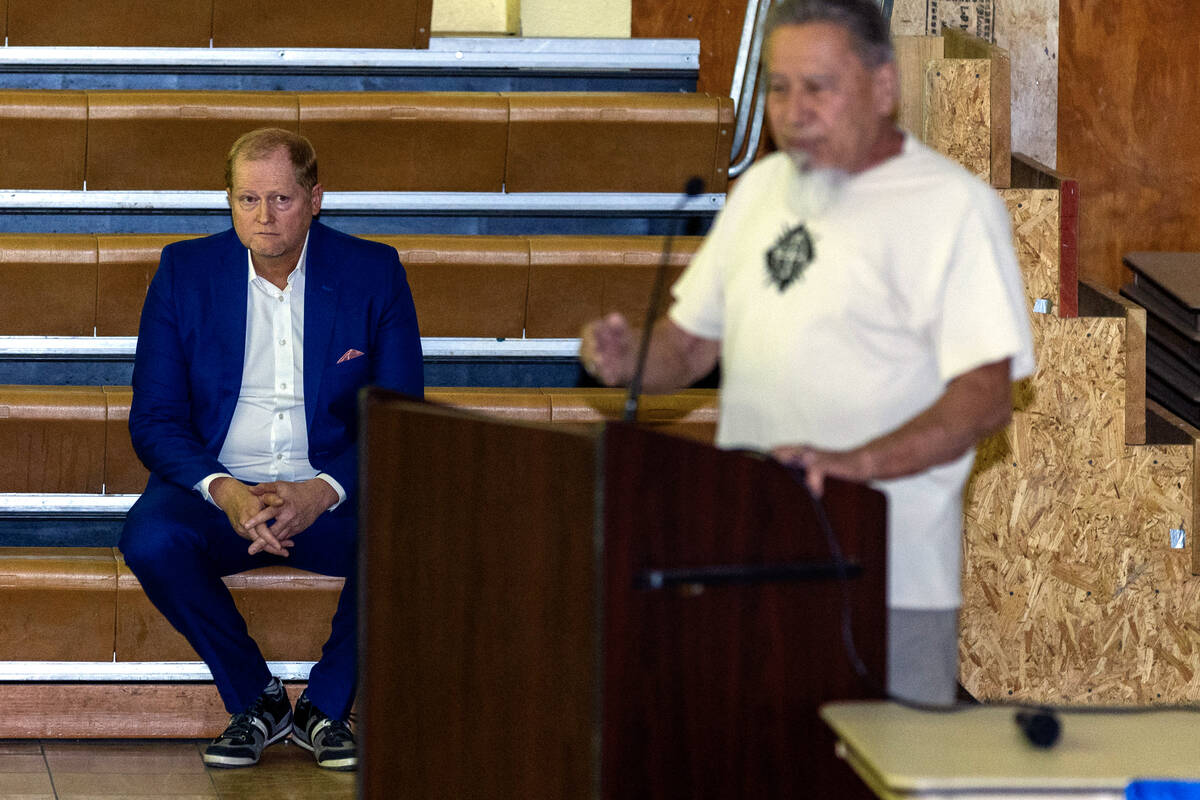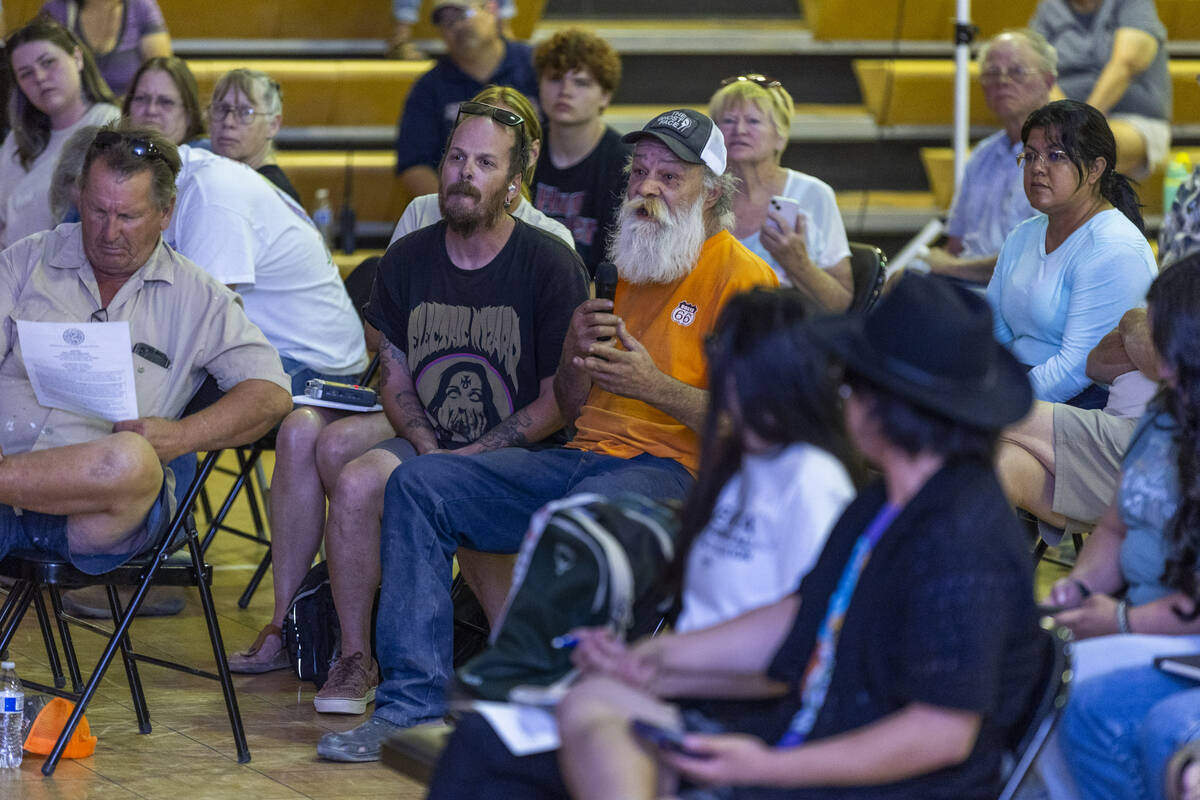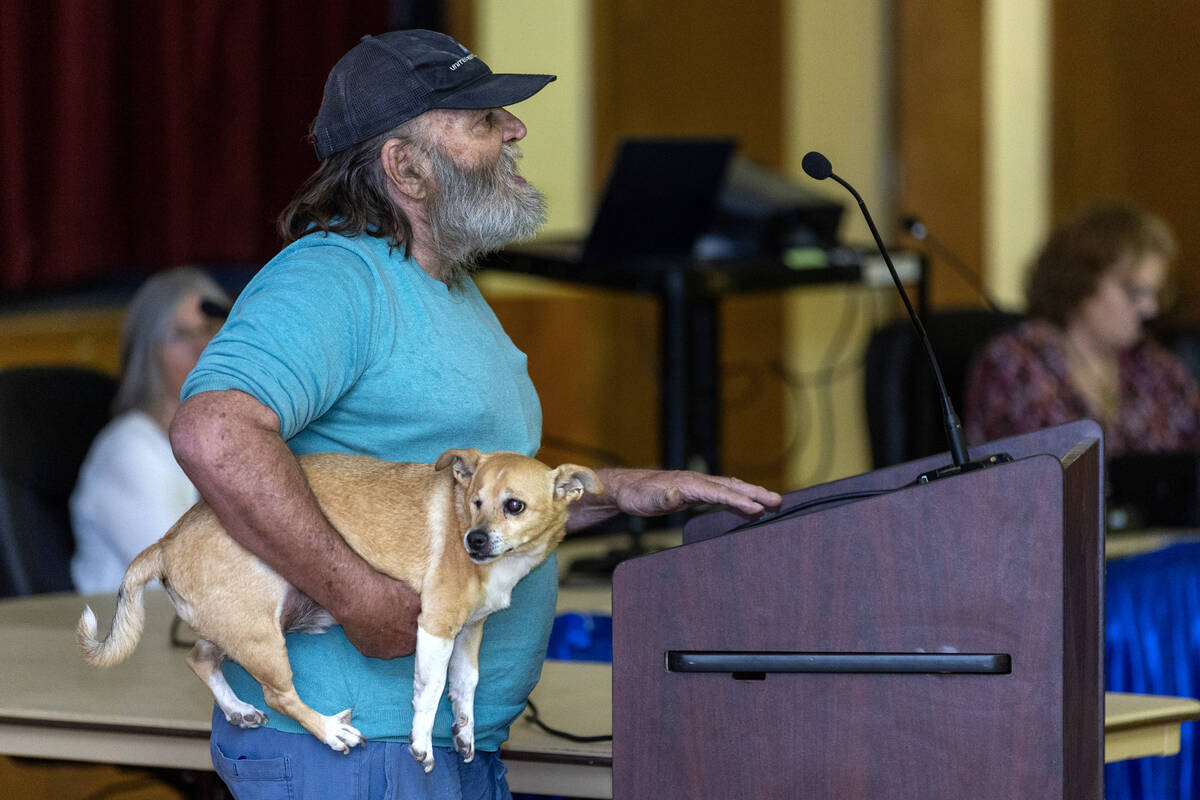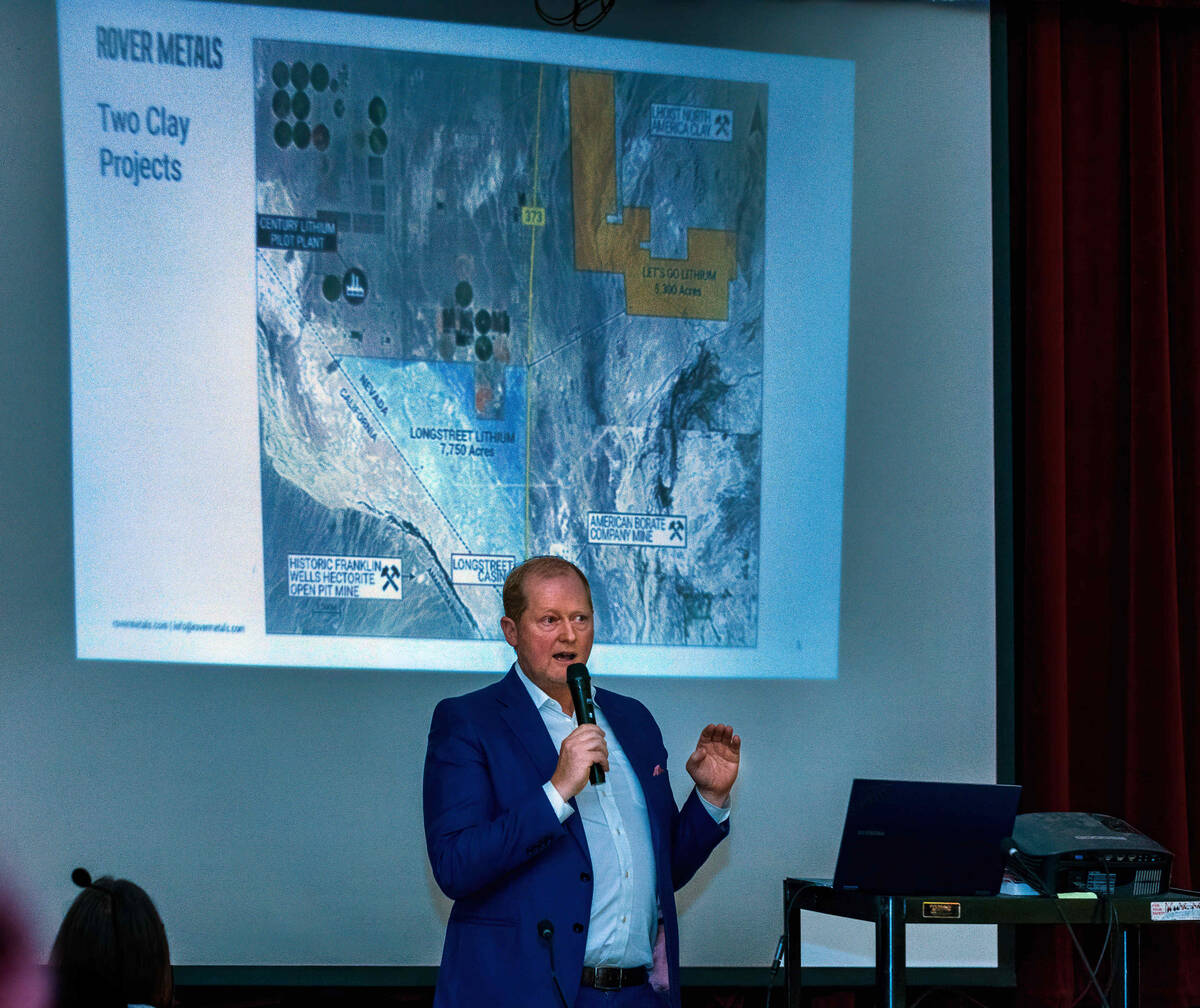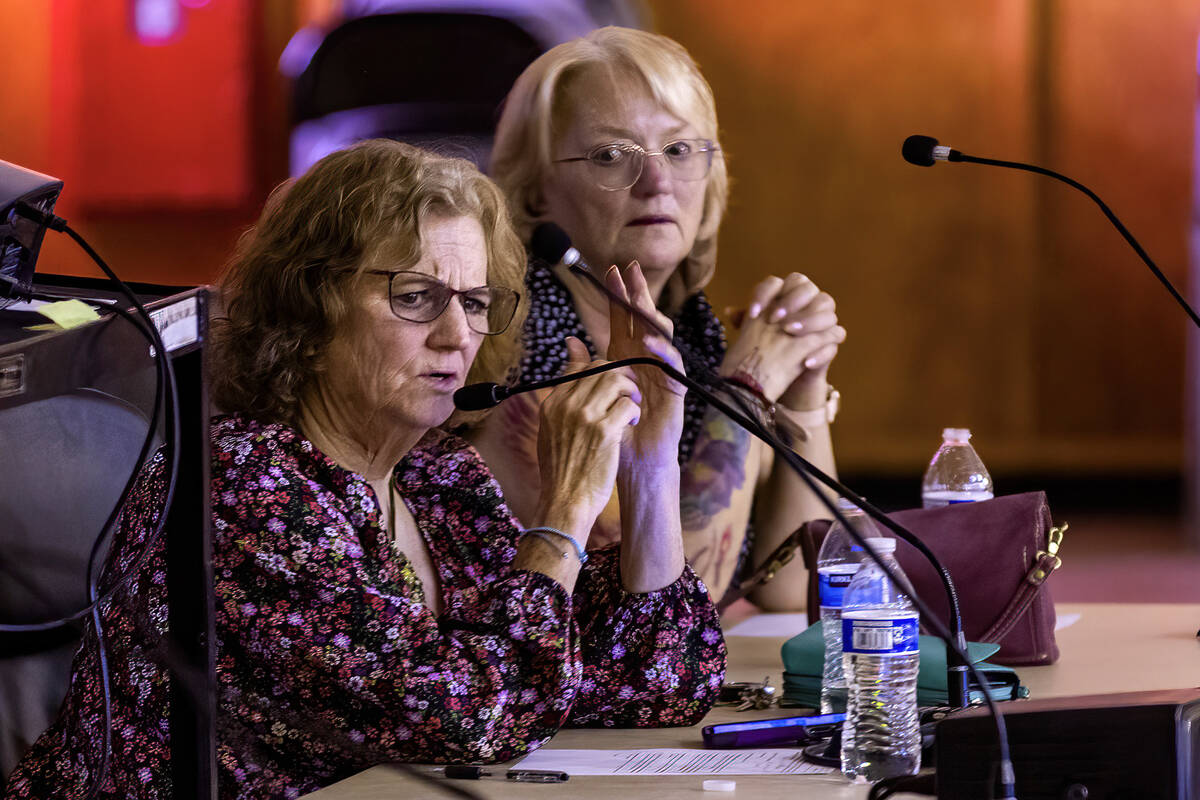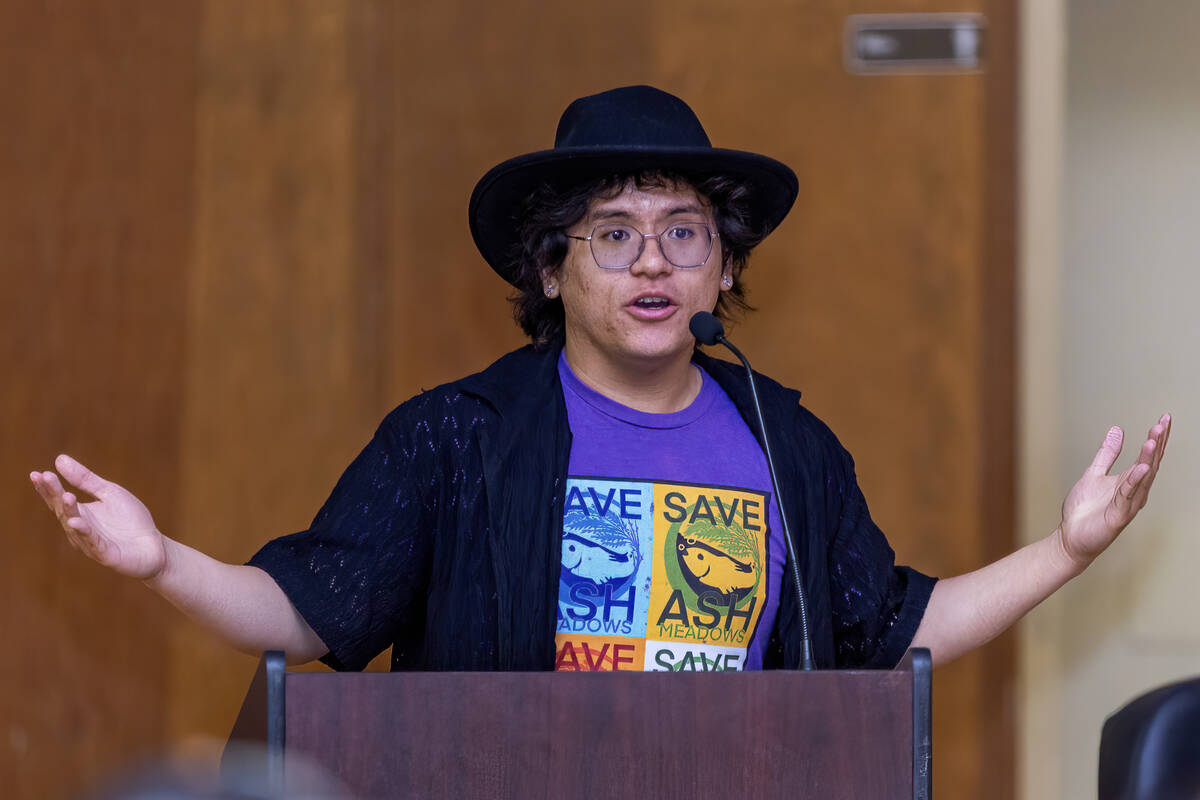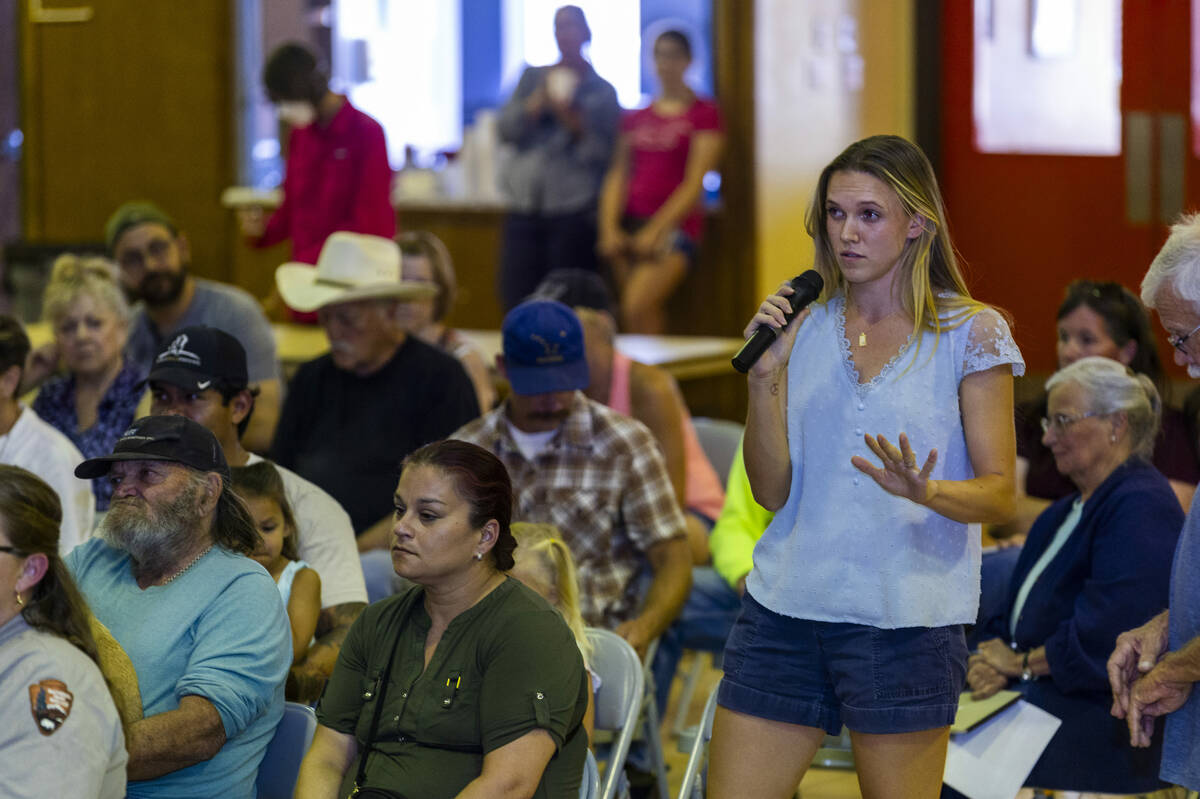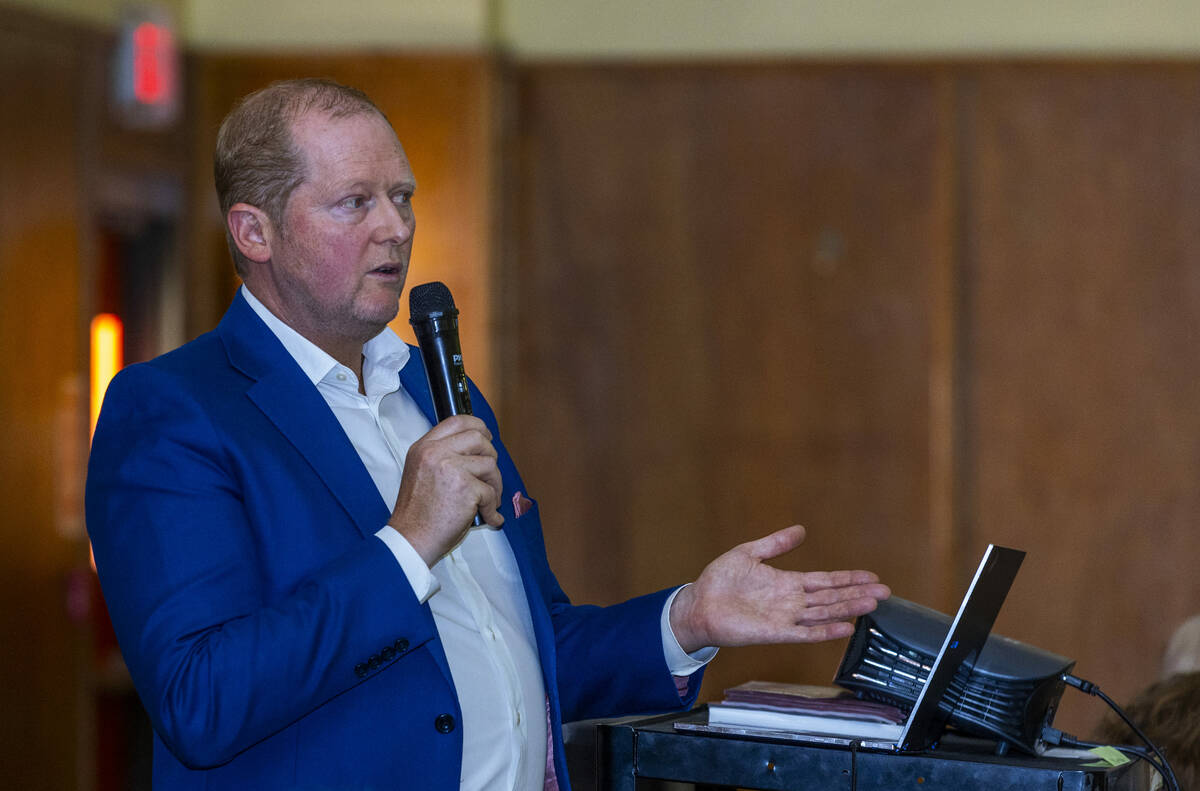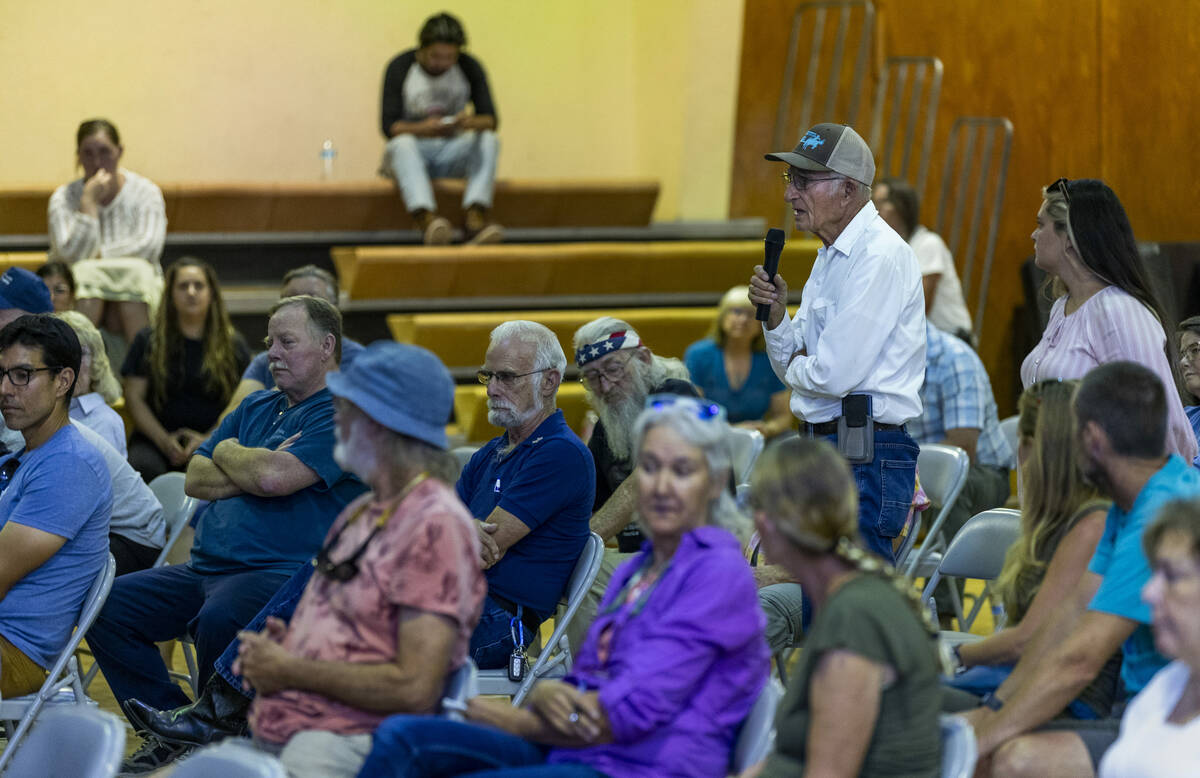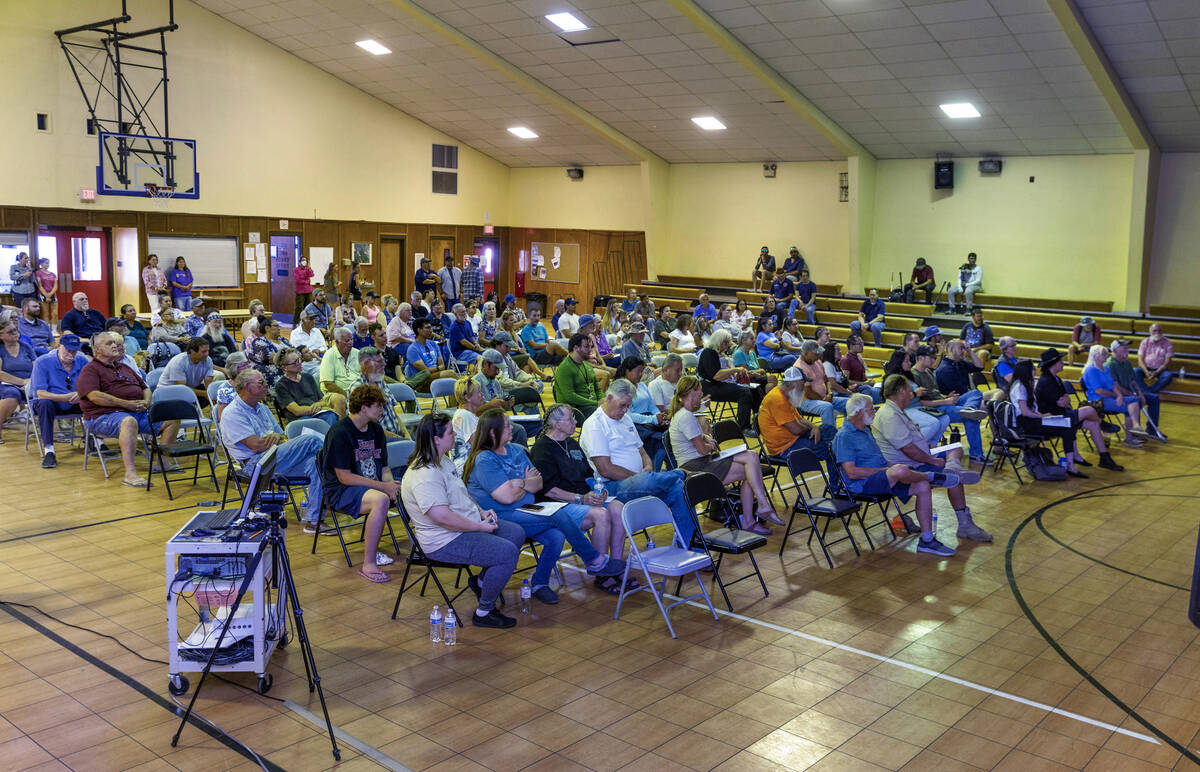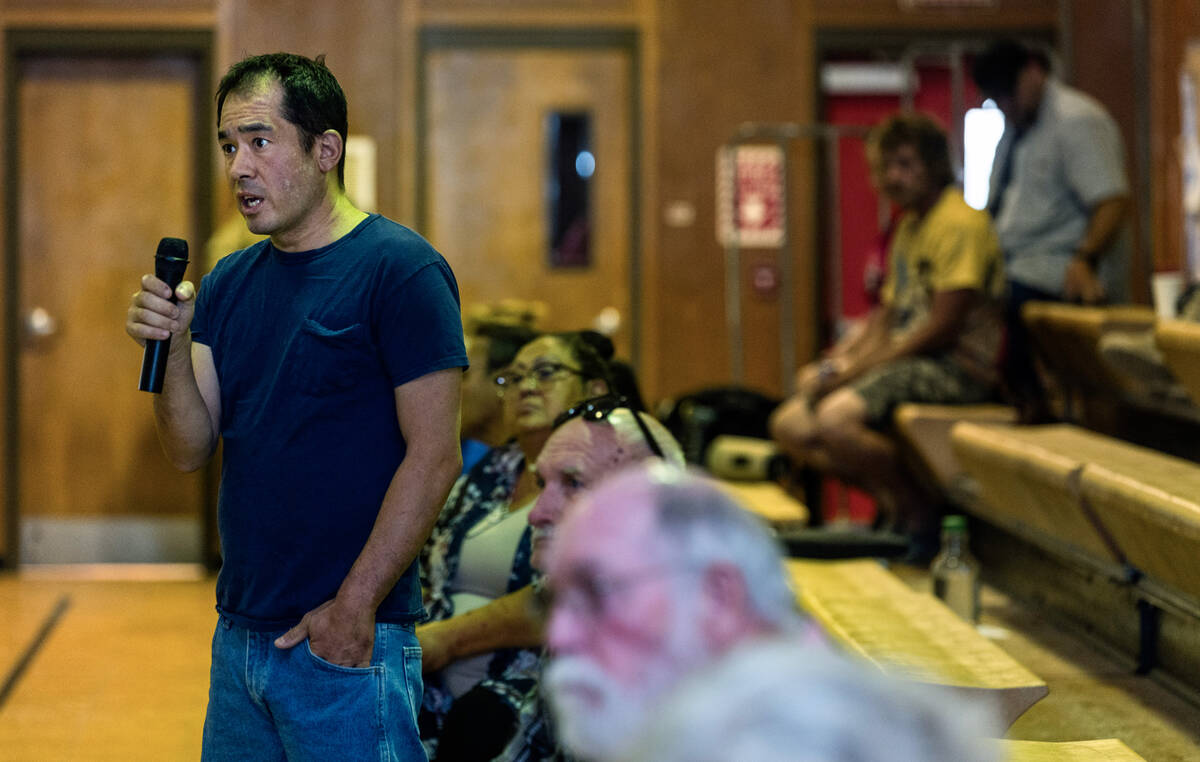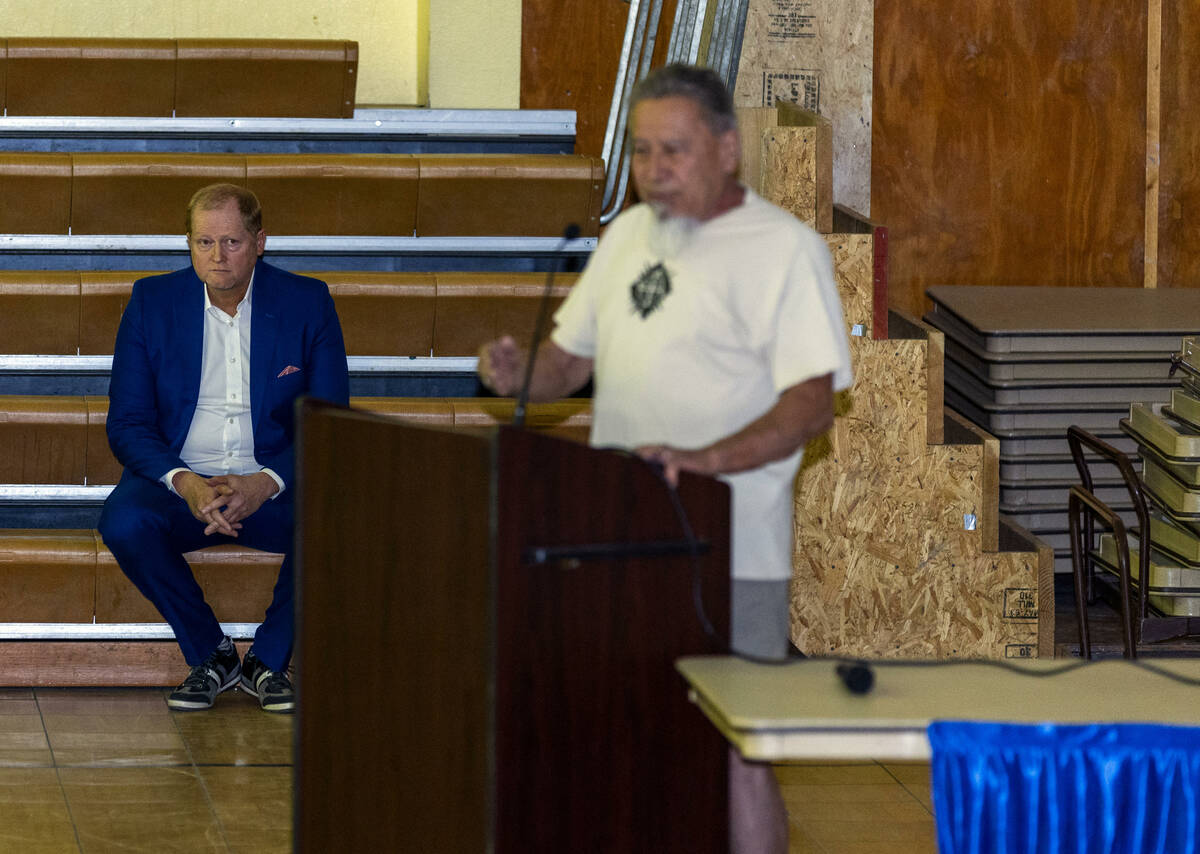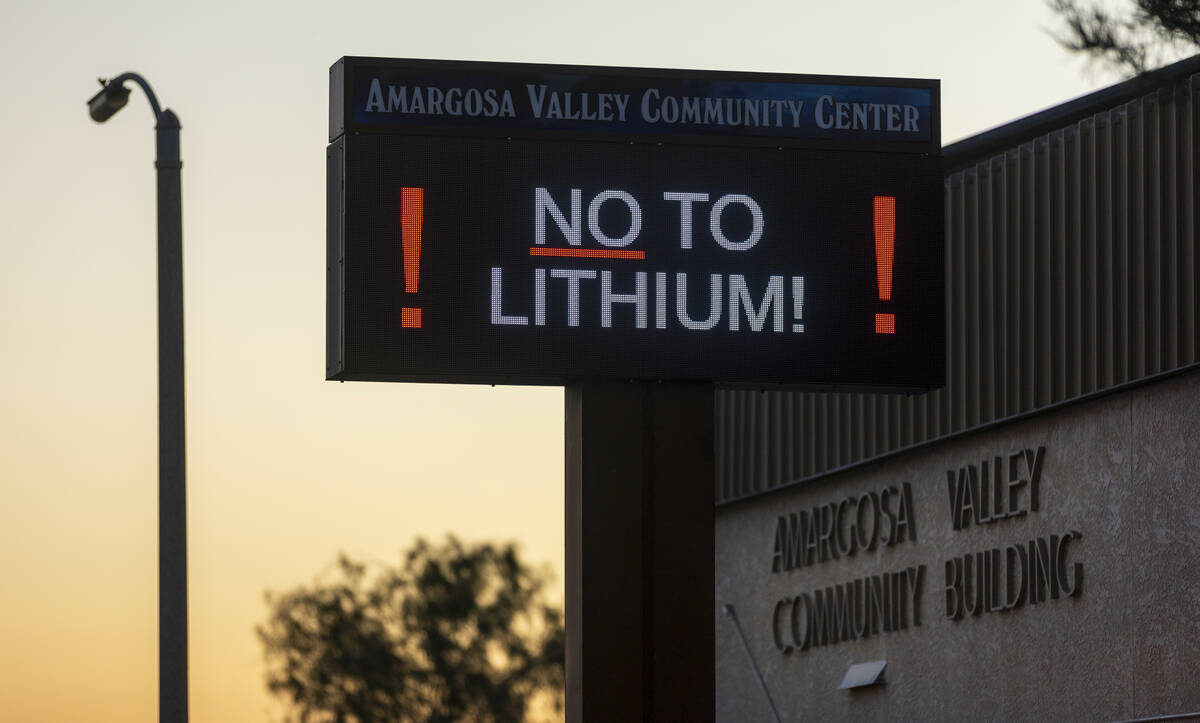‘You’re just the suit’: Residents spar with mining exec at tense town hall
AMARGOSA VALLEY — It had been a month since homeowners here woke up to about 400 wooden stakes hammered into the ground, representing Canadian exploration company Rover Critical Minerals’ claims to the lithium that may lie beneath the dirt.
More than 100 people filled the fold-up chairs laid out in the basketball court at the Amargosa Valley Community Center on Thursday night after work. A handful of toddlers lined the bleachers, glued to their parents’ phones and unaware of a laundry list of concerns about lithium mining that could one day become their problems.
Lithium, used in electric vehicle batteries, has been heralded by the Biden-Harris administration as a critical mineral needed to transition away from fossil fuels and combat climate change.
But in some cases, the 5-acre parcels in which Rover will search for lithium are situated a few hundred feet from people’s homes and businesses, in an area where some are already facing issues with the wells attached to their homes that pump water from the ground.
Not one person who spoke appeared convinced that allowing a search for lithium to proceed is to the town’s long-term benefit. Several residents and officials interviewed fear exploratory drilling could spell the end for Amargosa Valley.
“It’s about survival,” Carolyn Allen, the town board chair who has galvanized residents on this issue, told the Las Vegas Review-Journal. “The survival of what looks to be another ghost town should this continue happening.”
Mining executive tries to ease angry residents
Few hearts or minds were changed at Rover’s town hall that lasted more than three hours — an attempt to assuage resident opposition to exploratory drilling for lithium.
Judson Culter, Rover’s CEO, was there to clarify the company’s role and highlight the benefits of the project.
Drilling hasn’t yet begun, and a detailed plan of operations will not be made public until the end of the month. Once Rover has confirmed that there is a worthy lithium deposit, the company will pawn off the land to the highest bidder, likely a multinational company. Rover only carries the project to a feasibility stage, which could take about six years, Culter said.
“We have balance. We care about the future. We care about communities. We’re here to create jobs if we’re successful,” he said, adding that he’s a father who understands the importance of green energy in mitigating climate change.
Some residents raised concerns about the ethics of whatever company ends up making use of the parcels. In response, Culter pointed to the country’s rigorous, often decade-long environmental review process for mines proposed on public land.
To carry out exploration, Rover also is working with an independent drilling company, a representative from which he promised to bring to the next meeting.
“Why can’t the drilling company be here that was hired?” one resident asked during public comment. “What about our homes, our children, our water? You can’t answer these questions — you’re just the suit.”
What’s at risk?
Rover hired an independent hydrologist, too, to help map how deep the groundwater is, even though drilling likely will go just as deep as the water. It’s laying the groundwork for a clay mine, which Culter said is less water-intensive than methods used by Silver Peak, the only fully functional lithium mine in the U.S. near Tonopah.
At issue in the fight against the company is the little-known Amargosa River that fuels people and wildlife in southwestern Nevada. The river hydrologically connects drilling in Amargosa Valley to Ash Meadows Wildlife Refuge and Death Valley National Park, where endangered species like the famed Devils Hole pupfish live.
The Nature Conservancy, an environmental nonprofit, has separately studied the hydrological basin and concluded that there are concerns for Ash Meadows and the river at large should lithium mining occur. Culter told residents the company’s hydrologist doesn’t believe there will be any impacts as of now.
It can be costly for rural residents to have to drill their wells deeper to have basic access to water.
“Water is more valuable than gold,” said Erika Gerling, chair of the town board of neighboring Beatty, where the headwaters of the river are. “If we don’t have it, we don’t live here.”
All roads lead to D.C. — and the courtroom
A coalition of local officials like Allen, the nonprofit Amargosa Conservancy and the Timbisha Shoshone Tribe native to Death Valley has been working on petitioning the U.S. Secretary of Interior to implement a first-of-its-kind “mineral withdrawal.”
It wouldn’t affect existing mineral claims like Rover’s. However, it would prevent any new companies from staking their claim to the vulnerable area — something the historically right-leaning Nye County Commission threw support behind this month.
Culter, whose company had not commented publicly about the withdrawal until Thursday, told the Review-Journal that Rover has taken note of what he perceives as hostility.
“They don’t want anybody here,” he said. “Whether it’s an oil and gas lobby that’s behind that — who knows? It’s hard to say, but it doesn’t make any sense.”
It’s likely, too, that any plan for exploratory drilling or further mining would be held up in court. Patrick Donnelly, of the Center for Biological Diversity, affirmed during public comment his commitment to suing on behalf of disillusioned residents.
The mineral withdrawal petition is unique because it involves all three agencies under the U.S. Department of Interior: the Fish and Wildlife Service tasked with protecting pupfish, the Bureau of Land Management in charge of public lands and the National Park Service that operates nearby Death Valley National Park.
The coalition will head to Washington, D.C., next week to meet with the national heads of all three agencies, said Mason Voehl, executive director of the Amargosa Conservancy, which took its first-ever stance on mining when it sued Rover last year over separate exploratory drilling and won.
Sen. Catherine Cortez-Masto, D-Las Vegas, has spoken out against mining near Ash Meadows in recent congressional hearings with BLM Director Tracy Stone-Manning and Interior Secretary Deb Haaland.
The BLM’s Nevada office declined to comment on the status of negotiations around the withdrawal but promised in a statement to work with all parties involved.
“We’re just trying to get a clearer sense of how the department wants to handle this,” Voehl said. “We’ve done our part and delivered on the scientific support. There’s a high degree of urgency here.”
Contact Alan Halaly at ahalaly@reviewjournal.com. Follow @AlanHalaly on X.


